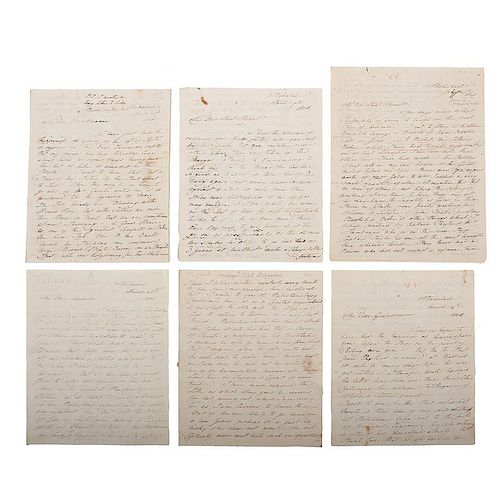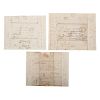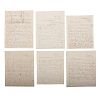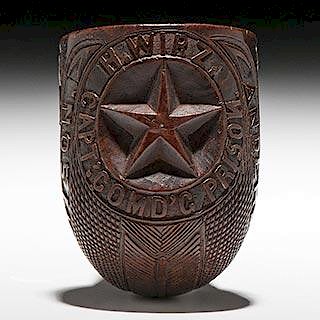Sara-Anne-Catherine Whinyates, Descriptive Letters Home from India, Ca 1806-1808
About Seller
6270 Este Ave.
Cincinnati , OH 45232
United States
With offices in Cincinnati, Cleveland and Denver, Cowan’s holds over 40 auctions each year, with annual sales exceeding $16M. We reach buyers around the globe, and take pride in our reputation for integrity, customer service and great results. A full-service house, Cowan’s Auctions specializes in Am...Read more
Two ways to bid:
- Leave a max absentee bid and the platform will bid on your behalf up to your maximum bid during the live auction.
- Bid live during the auction and your bids will be submitted real-time to the auctioneer.
Bid Increments
| Price | Bid Increment |
|---|---|
| $0 | $25 |
| $500 | $50 |
| $1,000 | $100 |
| $2,000 | $250 |
| $5,000 | $500 |
| $10,000 | $1,000 |
| $20,000 | $2,500 |
| $50,000 | $5,000 |
| $100,000 | $10,000 |
About Auction
Feb 21, 2017 - Feb 22, 2017
Cowan's Auctions dawnie@cowans.com
- Lot Description
Lot of 45 letters written in India by Sara-Anne-Catherine Whinyates-Robertson-Younghusband to her Grandmother Lady Frankland, Aunt Harriet, brother Sir Edward-Charles Whinyates, general in the British Armed Forces and veteran of the Battle of Waterloo, and her sister Amy. Ca 1806-1808.
Against her family’s wishes, Sara-Anne-Catherine Whinyates (SAC) married Lieutenant James Robertson of the Bengal Engineers in 1803. Her grandmother, Lady Frankland, Aunt Harriet, and two of her fourteen siblings, Amy and Sir Edward-Charles (a general in the British military and veteran of the Battle of Waterloo), were the only family that supported her and wrote her.
SAC and her husband initially resided in a modest home at Fort William. Situated on the eastern banks of the River Hooghly, the major distributary of the River Ganges, Fort William was an important stronghold and the major trading hub for the East India Company. From the time of their marriage until 1805, British and Indian soldiers clashed in the Second Anglo-Maratha War—Britain’s sixth conflict with India since 1766. British forces managed to maintain control of Fort William, but, by 1806, the region still experienced some violence. SAC wrote to her Aunt Harriet: It is shocking to see the numbers of wounded men and officers at present in the Fort some without legs some without arms and one unfortunate young man who had both eyes carried out of their sockets by a cannon ball it makes me melancholy when I see him pass by—the army have generously raised a subscription for him as in addition(?) to his misfortune he is nearly destitute (January 15, 1806).
As unfortunate as the wounded soldier was, SAC was equally fortunate. She managed to keep a vibrant social life within British Society. She explained, Calcutta is wonderfully gay and swarming with beautiful spinsters, Lord Lake gives a grand ball every Wednesday to which all his acquaintances go as they please without invitation (Fort William, November 16, 1806). Being a part of the upper crust, she kept impressive company including Colonel Marriot. [He came] here from Madras in charge of Tippors ten sons who are brought here prisoners in consequence of the horrid massacre at Wellmore in which it is supposed there were concerned, she wrote. [He] must be a man of some talents by his having the charge of twelve hundred women belonging to the Princes he is now returning to Madras to fetch three hundred of them here by land (Fort William, November 16, 1806). Between parties, feasting, sipping rose water, and gossip, not everything was perfect in paradise. A wet nurse who cared for one of the officer’s children smothered the colic child. SAC suffered a similar misfortune when her wet nurse threw down her screaming child and broke his arm. He almost died from the incident, but managed to survive. While he struggled for his life, both SAC's parents died. Her mother suffered from a long illness and still had ill-feelings towards her wayward daughter. Her father, on the other hand, cried for her and granted her forgiveness at his sudden passing. They left behind two of her sisters under the age of twelve and an exorbitant amount of debt with their estate in India. With all her elder siblings either in the military or residing in England, SAC took responsibility over her father’s estate and her orphaned sisters. She wrote her grandmother:
...[T]heir education and manners have been entirely neglected it is grievous really to see it! And how much in many respects they have been ruined by the natives and what horrid mahometan customs and ideas they have….they have been suffered to run in the sun till they are blacker than many half castes and seem to never have been contradicted in their whole lives (Fort William, July 14, 1806).
Neither sister could read, write, or speak English. SAC sent her two sisters back to England to learn English manners and become proper ladies. Several years under the care of her grandmother and aunt vastly improved SAC's younger sisters' education. They were, however, unable to find any suitors in the area. Her family proposed that her sisters return to India to capture an eligible bachelor. SAC wrote to her brother, Sir Edward-Charles, A woman of twenty in India is thought a lot—I mean to keep their age a secret or rather tell white lies respecting it. Girls of 13 and 14 are what please men in this country (Fort Allahabad, September 20, 1808). Naturally, her sisters dreamed of their prospects. SAC, however, did not indulge their fantasies. My sisters have romantic foolish ideas of beauty in a man—nothing can be more absurd—and it is the last thing to be thought of in a husband…a good temper and kind disposition and a good station is what they ought be concerned with (Fort Allahabad, September 20, 1808). Considering the fact she eloped with her husband, it is hard to say that romance did not play some part in her union. Her husband, Robertson, was very practical and succeeded in his career. He earned another promotion as chief engineer, which meant a higher salary and a new location. The family gathered their things and left fashionable Calcutta for Fort Allahabad.
Built in 1583 by the third Mughal emperor, Akbar, on the banks of the Yamuna near the confluence of the Ganges, Fort Allahabad was one of Akbar’s largest fortifications. It contained the Zenana Palace, the Ashoka Pillar, and the much revered Akshayavat or "immortal tree". Legends say that if anyone jumped from the centuries-old banyan tree, he would attain immortality. Consequently, enormous amounts of suicides forced the tree to be hidden. Till this day, it is not open to the public. In addition to its religious importance the fort was in a good strategic position. The East India Company took control of it in 1798.
SAC was very pleased with their new home near the fort:
We have two—one R has built merely for sleeping one immense large, broad, high 2 room on an [illegible] spot with one adjoining for the children with no furniture but the beds! So we really feel the heat as little as possible (Fort Allahabad, April 23, 1808)… We have a large guard of most fierce looking fellows to guard our bungalow. They are part of a band of robbers and cut throats—they have [illegible] this strange sort of honesty that they will allow no one to rob the people in whose pay they are—some of these men have the finest determined countenance I ever beheld, she wrote (Fort Allahabad, January 24, 1808).
Protection was necessary for their bungalow because of high tensions with the people of India. While traveling down river SAC’s boat accidentally knocked over and broke a sacred pot on Amreet Kow(?)- The Great Maratha Chief palace steps. The crowd exploded and swarmed the boat. She described the scene:
In five minutes fifty or sixty armed men were on board who fell upon my servant and warer men and boat men in the most inhuman manner it was presently a scene of blood! 5 or 6 hundred assembled on the shore who cried out to sink the boat and crush us to death inside! For what purpose they threw enormous stones and pieces of masonry from ashore many of these had not providence averted the blow would have crashed us to the most horrible deaths…Instant death appeared inevitable! Despite the threat to her life, she bravely went out into the crowd and threatened them with European justice...and then by almost a miracle got on shore and made [her] escape through the midst of enemies in a plangaine(?) (Benares, July 29, 1808).
She ran to the steps of her magistrate's home for asylum. Her husband, who was ahead of the party, jumped in a boat and traveled all night to reach his wife. Relieved, the couple traveled the rest of the way to their destination.
Robertson felt more concerned that the climate threatened his health more than a potential war. He wanted to return to England. His wife, on the other hand, felt the climate agreed with her and did not want to leave. SAC wrote:
We have a near prospect of returning to Europe with a comfortable fortune…many people advise him strongly against him [taking it] for certainly if he was to remain some years here he might be worth an immense fortune- but he says he does not wish for that, and will be greater content with a moderate one, and that nothing can compensate for the separation from our children and sake of health for he begins to fancy his health requires a Europe climate—a very common fancy with people who are growing rich ( Fort Allahabad, April 23, 1808).
Robertson did get a larger commission as Principle Engineer in the Field, which allowed his family to experience the same comforts they had in India in England. While planning to return home, tragedy struck when SAC's grandmother and aunt passed away unexpectedly, leaving her sisters without wards for the second time. Robertson delayed their departure from India so they could receive her sisters and make sure they were settled before they returned home. During that time, however, he died.
Widowed, SAC married Captain Robert Younghusband of the 53rd Foot Regiment in Calcutta on February 1811. Within five years, the army stationed them at St. Helena, where Napolean was exiled. Particularly interested in SAC's shared blood with Oliver Cromwell, Napoleon received her several times. She later wrote about her experience with the General and published it in Blackwood's Magazine in January, 1834. Her love of gossip eventually caused considerable trouble when a magistrate found her guilty of slander against Mrs. Nagle. Her pernicious rumors almost resulted in a duel. Consequently, she was fined 250 pounds. In addition to the letters are two documents concerning her father's estate in India.
Provenance: N. Flayderman and Co., Inc.All the letters are in good condition with typical folds. Some have colored pencil and pencil markings from a previous owner.Condition
- Shipping Info
-
SHIPPING. At the request of the buyer, Cowan's will authorize the shipment of purchased items. Shipments usually occur within two weeks after payment has been received. Shipment is generally made via UPS Ground service. Unless buyer gives special instructions, the shipping method shall be at the sole discretion of Cowan's Auctions, Inc.. Cowan's is in no way responsible for the acts or omissions of independent handlers, packers or shippers of purchased items or for any loss, damage or delay from the packing or shipping of any property.
-
- Buyer's Premium



 EUR
EUR CAD
CAD AUD
AUD GBP
GBP MXN
MXN HKD
HKD CNY
CNY MYR
MYR SEK
SEK SGD
SGD CHF
CHF THB
THB














